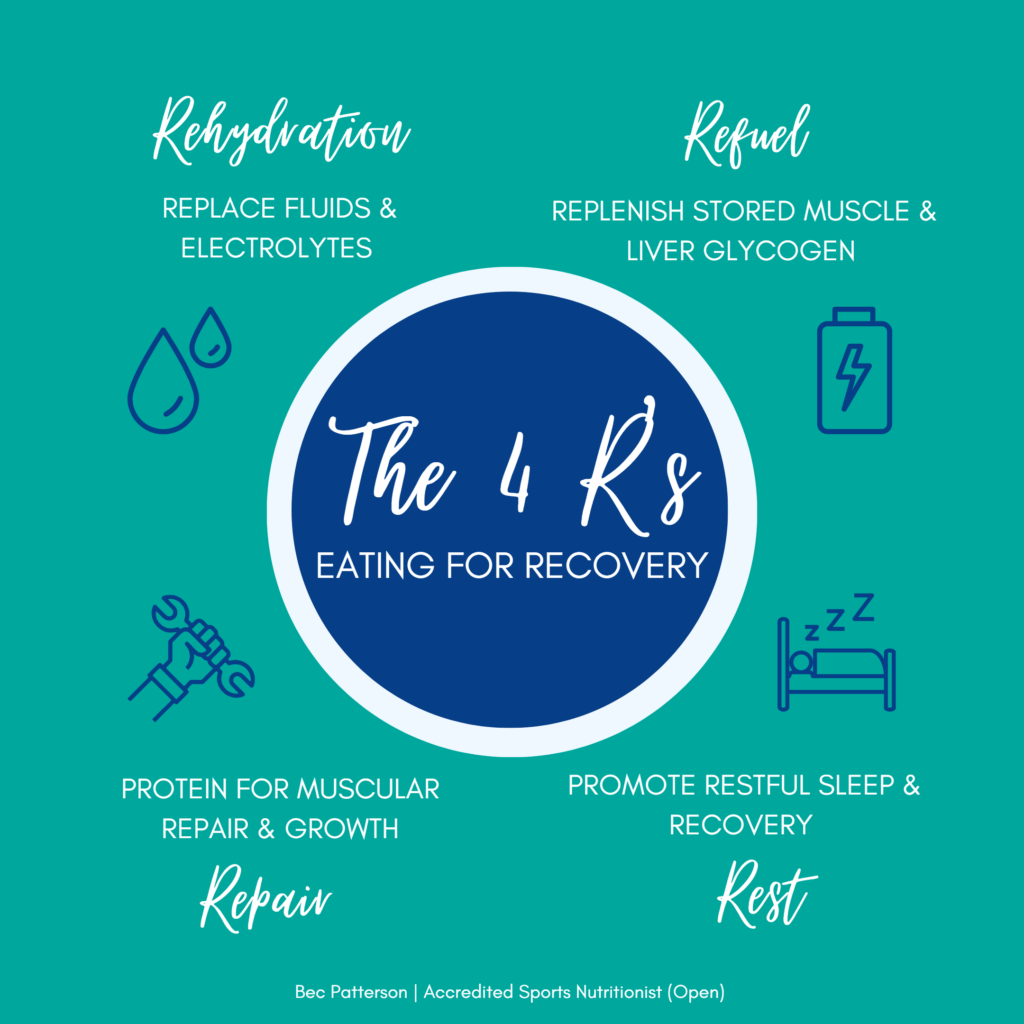The 4-R’s of Nutrition for Exercise Recovery
When considering recovery post-exercise, a four-part framework has been developed to guide nutrition and lifestyle practices to optimise the process. The 4 R’s Framework is made up of Rehydration, Refuel, Repair and Rest.
Rehydration
During exercise, anywhere from 0.3 to 2.4 litres of sweat can be lost per hour (depending on the activity). The primary goal of this phase is to replace fluids and electrolytes lost during exercise. This is important for maintaining the body’s electrolyte/water balance. This can be done using pure water with a pinch of salt, sports drinks and fluids like flavoured milks or juice. For optimal fluid intake, it is recommended that between 35-45ml per kg of bodyweight is consumed depending on your daily activities, exercise type and amount of sweat lost (including sports drinks, tea and coffee). Someone who works a physically demanding job or sweats heavily may require a higher fluid intake.
Refuel
during exercise, the body depletes muscular stores of glycogen for use as energy. Post-activity nutrition should aim to replenish the body’s carbohydrate stores for use in further activity. Immediately after exercise, refuelling with high-GI carbohydrates is recommended to restore the body’s glycogen stores. The exact recommendation for carbohydrates varies depending on total daily energy expenditure, activity type and time to next session but should be consumed within the two hours post-exercise.
Repair
Recover refers to the consumption of protein post-exercise to ensure the maximal protein uptake for repair by the muscles. Priority should be given to consuming the total daily intake of protein evenly spaced throughout the day. It is recommended that a protein serving of 20-40g (0.25-0.4g/kg of body weight) is consumed approximately every 3-4 hours to maximise muscle protein synthesis. Eating a high quality source of protein within 2 hours post exercise, has also shown a significant increase in protein synthesis.
Rest
Rest refers to foods consumed before rest to promote recovery and getting restorative sleep. It is recommended to consume slow-release protein sources before sleep as this helps to enhance muscle protein uptake overnight without interrupting other digestive processes. Getting high quality sleep also helps to regulate our nervous system, immune system and stress responses. For optimal conditions, it is recommended that adults sleep between 7-9 hours per night while adolescents and children require a greater amount of sleep (8-10+ hours), with athletes requiring more again (9-10+ hours).

As an exercise scientist and sports nutritionist, it is my job to help you to understand your energy needs and help you optimise your pre-training, during exercise, and post-training nutrition strategies and help you understand how this fits into your overall nutrition strategies. Get in touch with us to book your initial nutrition consult today!
References
Bonilla et al, 2020 – DOI 10.3390/ijerph18010103
Kerksick et al, 2017 – DOI 10.1186/s12970-017-0189-4
Watson, 2017 – DOI 10.1249/JSR.0000000000000418
